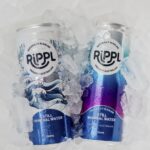PEOPLE
How I Replaced Alcohol With Exercise – And Turned My Life Around

WORDS: Justine Whitchurch PHOTOGRAPHY Supplied
Fitness coach and author Justine Whitchurch has inspired thousands of people to reach for a happier and healthier life – a stark contrast to the lost and much defeated alcoholic mum of two who was knocking on death’s door 10 years ago.
NINE years ago, I was a shell of the person I am now.
In fact, at times I find it hard to recognise the person I am reminded of looking through old photographs and prompted by Facebook memories. The only thing I can truly still connect with is the depth of my desperation – a feeling that thankfully, I no longer have, but will never forget.
Secretly, I hope this feeling will stay with me forever as a self-awareness tool to prevent me from finding myself in that position again.
In 2011, at the age of 38, I hit rock bottom – both psychologically and physically. As a result of the numerous personal challenges I was facing, my already baseline anxiety turned into clinical depression, agoraphobia and a dependency on medications to help me survive. My first marriage had ended, there were custody issues, my daughter was diagnosed with Type 1 diabetes, financial insecurity was looming and more importantly, I had lost sight of all the ‘selfs’ – self-worth, self-respect, self-discipline and self-love.
Of course, there was also the elephant in the room – using alcohol 24/7 to medicate my way through each day.
I would wake up, get the kids ready and take them to school. Then I would return home, down a few glasses of wine, take some medication and go back to bed. I would set the alarm for 2 pm for school pick up and when this was an impossible feat, I would throw in the emergency call to the other school mums to assist.
There was always the bottle of wine on the table with dinner and another hidden elsewhere in the house but guaranteed, more than one on the go. And with mummy wine culture on the rise, it was easy to conceal my dependency with a justified reason to drink because – ‘mum life’, right?
And there was always vodka if I wanted to go undetected. Occasionally, I would slip up and someone would find a bottle in an obscure place and I would somehow talk my way around it. Although others were beginning to see the cracks, my GP was the only person who directly confronted me, as my liver readings were showing signs of substance abuse.
My weight plummeted to 103 pounds and my health issues were extensive.
In the very last part of my addiction, my GGT (liver readings) were more than 2000, triglycerides were through the roof and platelet count was dangerously low. My body was covered in bruises, my hand was fractured in two places (with no recollection of how this occurred), my hair was falling out and I had not had a period in nine months.
There were even a few trips to the emergency department where I was advised, in no uncertain terms, my health had reached a dire point. On one occasion I had been brought in by ambulance, non-responsive, and my alcohol concentration was 0.32.
The alcohol had long been a crutch, from a ‘wind-down’ at the end of the day to a ‘calm the nerves’ before an event or situation that made me feel uncomfortable. For a long time, alcohol was a friend, my reliable coping mechanism and perhaps even my saviour. But it was no longer working for me. It was not-so-silently killing me.
There was no real conscious decision to get sober; more of a choosing not to die.
In January 2012, I moved back to my home state to be closer to my family and receive the help that I now desperately needed. My parents insisted I went into counselling and rehabilitation and did everything they could to support me, including taking over with the kids where needed. My daughter, who was nine at the time, looked at me one day with tears in her eyes and said: “Mum, I am scared you are never going to get better!”
That statement infiltrated me on a very deep, subconscious level and that day marked the beginning of me becoming a willing participant in my own recovery. I entered a day program at a rehabilitation clinic and continued three days per week for almost four months. I also took the advice of my specialists and started exercising.
At that point in time, this decision was purely made to satisfy my family’s overwhelming desire for me to stay on track. I had little knowledge or understanding of how this simple decision was going to be possibly the biggest catalyst in my recovery.
In the beginning, I was far from fit. The training was basic and my ability to cope was minimal. But without the alcohol preventing my natural coping mechanisms from kicking in, I had one thing I hadn’t had in a long time. Resilience.
With every challenge I conquered physically, I grew stronger mentally and quickly learned the significant correlation between good physical health and strong mental health. The best part was that I learned that when I applied the same sense of discipline to other areas of my life, my coping mechanisms to deal with everyday issues also increased.
Being physical gave me the ability to face life’s challenges from a healthier perspective – creating habits that work ‘for me’ instead of ‘against me’.
Now, I’m on a mission to lead the way and help others find a healthier way of coping with their mental health and life challenges. And most importantly, to challenge the cultural narrative that it is ‘normal to drink’.
What is not just socially accepted, but ‘expected’, is creating what seems like a mountain that is just too high for some to climb.
Visit: www.justinewhitchurch.com.au learn more.














